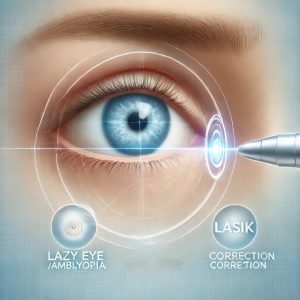-
See the Difference: Save $1,000 on LASIK , Find More
*Must mention this promotion and be treated before April 30 of 2025 to qualify. $1,000 off for both eyes on standard Wavelight price, $500 off for one eye. Cannot be combined with any other offers.
Can I Have LASIK if I Have Lazy Eye?
Whether LASIK Eye surgery is the right option for you will be dependent on many factors, including condition, prescription and overall health history. At LasikPlus, our experienced doctors, through a comprehensive eye examination, will help determine what options are best for you, including addressing Lazy Eye.

Can I Have LASIK If I Have a Lazy Eye?
Lazy eye, or amblyopia, is a condition that typically develops in childhood and affects vision due to improper brain-eye communication. If you’re considering LASIK to improve your vision and you have a lazy eye, you’re likely wondering whether it’s a viable option. In this article, we’ll explore how LASIK works, whether it can help with amblyopia, and key considerations to help you make an informed decision.
Understanding Lazy Eye (Amblyopia)
Lazy eye occurs when one eye has significantly weaker vision compared to the other, often due to misalignment, a significant refractive error difference, or deprivation (e.g., cataracts in childhood). Amblyopia primarily stems from neurological rather than structural issues with the eye.
While glasses, contact lenses, or corrective surgery can address the refractive error, they typically do not “cure” amblyopia itself, as the condition affects the brain’s ability to process visual input.
How LASIK Works
LASIK (Laser-Assisted In Situ Keratomileusis) is a laser vision correction procedure designed to reshape the cornea, improving refractive errors such as nearsightedness, farsightedness, and astigmatism. LASIK can help achieve better focus and clarity by addressing corneal irregularities.
Can LASIK Treat Lazy Eye?
While LASIK can improve the refractive error in the weaker (lazy) eye, it cannot directly address the neurological aspect of amblyopia. This means that while the vision in the amblyopic eye may improve slightly after LASIK, it is unlikely to fully match the clarity of the stronger eye.
Several factors determine whether LASIK is appropriate for someone with lazy eye:
- Stability of Vision Your vision must be stable for at least a year before considering LASIK. This applies to both eyes, including the lazy eye.
- Age and Previous Treatment Most eye surgeons recommend completing any lazy eye treatments (like patching or vision therapy) before considering LASIK. The best outcomes typically occur in adults whose amblyopia has already been treated in childhood.
- Degree of Vision Impairment The severity of your lazy eye affects LASIK candidacy. Patients with mild to moderate amblyopia may be better candidates than those with severe cases.
Who May Benefit:
- Adults with mild amblyopia: If you have functional use of both eyes, LASIK may still enhance overall vision by correcting refractive errors.
- Stable amblyopia: Candidates with stable vision and no progressive conditions may be considered for LASIK.
Who May Not Benefit:
- Severe amblyopia: Those with very limited visual function in one eye may not see significant improvement from LASIK.
- Other ocular conditions: Individuals with keratoconus, retinal issues, or unstable vision are generally not good candidates for LASIK.
Key Considerations Before Choosing LASIK
- Comprehensive Evaluation: A thorough eye exam by a qualified ophthalmologist is essential to determine if LASIK is suitable for your specific condition.
- Realistic Expectations: Understand that LASIK can enhance refractive clarity but won’t “cure” amblyopia.
- Alternative Options: Other treatments, such as photorefractive keratectomy (PRK), might be recommended depending on corneal thickness or other factors.
Next Steps
If you’re interested in LASIK but have amblyopia, we invite you to schedule a FREE consultation with one of our experienced doctors. The medical team will provide tailored advice based on your medical history, vision needs, and expectations.
FAQs
- Can LASIK make my lazy eye worse?
No, LASIK does not worsen amblyopia. It may enhance vision in the affected eye by correcting refractive errors. - Is LASIK safe for people with lazy eye?
Yes, for some individuals with mild to moderate amblyopia, LASIK is considered safe. However, a comprehensive evaluation is necessary to ensure you’re a suitable candidate. - Are there other treatments for lazy eye?
- In childhood, patching, vision therapy, and corrective lenses are the primary treatments. In adults, vision therapy may offer some improvement, but the condition is generally stable by adulthood.
- If LASIK is not suitable, you may be a candidate for
- PRK (Photorefractive Keratectomy): An alternative laser eye surgery.
- Implantable contact lenses (ICLs): Small lenses implanted within the eye.
- Advanced eyeglasses: High-index lenses or specialized coatings.
Sources
- American Academy of Ophthalmology (AAO) – Amblyopia Overview
- National Eye Institute (NEI) – What is Amblyopia?
YOU MIGHT ALSO LIKE...
VISION CENTERS NEAR ME
Enter your zip code, city, or a doctor name below to find a vision center.
Find out if LASIK is right for you
Congratulations!
Your vision issues can most likely be corrected with a LASIK procedure. Schedule a free consultation today.
Answer 5 simple questions to see if you are a candidate
What is your age group?
Do you wear...
With corrective lenses, do you have...
Have you ever been told that you have astigmatism?
Have you ever been told that you have dry eyes?
Request an Information Kit
Learn about your surgeon, the latest advanced technology, procedures, options and benefits, financing options, and what to expect from your LASIKPlus experience.









